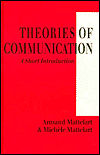A Short Introduction
By Armand Mattelart and Michèle Mattelart
Originally published as Histoire
des théories de la communication
Éditions La Découverte, Paris, 1995
Translation © Susan Gruenheck
Taponier & James A. Cohen, 1998
Sage Publications Ltd.
Reviewer: Channing
Hillway
Aristarcus Communication
![]()
-
"The age of the
so-called information society is also that of the production of mental states.
It will be necessary to rethink the question of freedom and democracy. Political
freedom cannot be reduced to the right to exercise one's will. It also lies
in the right to control the process whereby that will is formed." (p. 156)
Armand Mattelart and Michéle Mattelart cap their somewhat truncated survey of the history of theories of communication with the above short paragraph, suggesting a much more forceful explication than is presented in the work as a whole. If one were to first read their conclusion, which occupies only two pages, it would create a very inaccurate impression of the book's content. If one views the final statement, above, to be accurate, it is more a recommendation to seek out other works by Armand and/or Michéle Mattelart with the hope, if one does not read French, that they have been translated.
The French title, Historie des théories de la communication, is more accurate than what is offered as the English title translation. The work is almost an historical annotated bibliography in narrative form and reminds one of a summary of a graduate level literature search with a European, and, more specifically, a French perspective.
The Mattelarts correctly point out that communication is "situated at the crossroads of several disciplines," mentioning "philosophy, history, geography, psychology, sociology, ethnology, economics, political science, biology, cybernetics and the cognitive sciences." They assert that the "social science" field of communication has borrowed scientific models from the natural sciences in an attempt to resolve "the question of its own scientific legitimacy." Such a broad description is very appealing and, again, is not an accurate portrayal of the major content of the work. Other elements of the introduction suggest that a much larger work may have originally been conceived and that practical considerations resulted in the more truncated and more narrowly focused work that was finally published, which, if true, would resonate with all theorists where global aspirations often must be abandoned to accommodate practical reality.
Theories of Communication seems to be primarily concerned with economics, political science and mass communication theory, bringing these and other theoretical perspectives to bear on the theme of social engineering that backgrounds throughout the book and occasionally rises to the surface. Such intent is reflected in their final statement, as noted above.
Reading the book gave me a constructive sense of satisfaction while generating some frustration that none of the theorists and influentials cited had been accorded their due. The book is simply too short for any in-depth treatments, just 156 pages to cover such a broad topic. There is insufficient space to give more than passing notice to any but a few. One is, nevertheless, richer for the experience. Any number of questions are sure to raise themselves into the reader's consciousness. Some of the names cited are likely to be unfamiliar even to seasoned faculty members, with European and South American figures receiving recognition that may be denied to them in other works.
The Mattelarts' perspective may lead one to reconsider what is easily dismissed as French cultural xenophobia, exemplified by the extended debate over whether Disney should be allowed to establish the EuroDisney in France under grave fears of cultural dilution. The same desparation has been expressed regarding the Internet, which is dominated by the English language, with fears of French language decline. The Mattelart's perspective suggests, to this reader, that the loss of the French, as well as other diverse points of view, would serve to reduce the capacity for critical thinking, an important point of which we should all be periodically reminded.
The rather limited audience for Theories will be university-level majors, graduate students and faculty in the field of communication, and others interested in expanding their background in communication theory. Theories is not "a page-turner." It's easy to conclude that something has definitely been lost in the translation, from French to English. It may well find a place as a complementary supplement to a more traditional text, and it provides a valuable alternate perspective.
![]()
